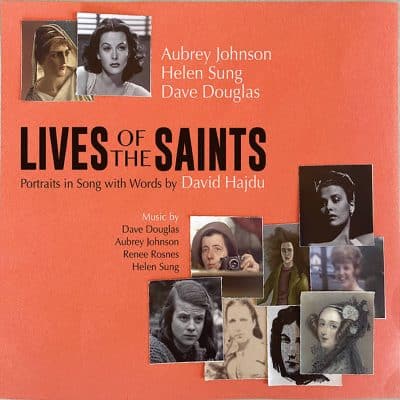David Hajdu Lives of The Saints
 David Hajdu
David Hajdu
Lives of The Saints
Sunnyside
David Hajdu is a writer-producer who has written the lyrics for Lives of The Saints. These saints are not those of the canon of the Catholic Church but ordinary individuals who have attained that status in his mind. These are women who did exceptional work but suffered in some way for what they did or what they believed. He assembles some of the most respected musicians and composers in jazz to tell the stories of these ten remarkable women. He had never worked with any of these musicians before. They are pianist/composer Helen Sung, vocalist/composer Aubrey Johnson, and trumpeter/composer Dave Douglas. Joining them are woodwind player Chet Doxas, cellist Marika Hughes, bassist Simon Willson, and drummer Rudy Royston. Samuel Torres adds percussion to two tracks.Finally his longtime collaborator, Renee Rosnes wrote the music for two pieces. The other composers handled the rest. These ‘saints’ range from the famous to the unknown, from ancient history to relatively recent times.
The program commences with the celebratory “Enchantress of Number,” composed by Johnson about Ada Lovelace, the visionary of computer science who wrote the first algorithm. There’s a buoyant piano solo from Sung, expressive trumpet from Douglas, and thunder from Royston as Johnson’s gorgeous voice takes lyrics like these – “She made numbers sing/She made numbers soar/Made numbers do things they weren’t made for/She set numbers free/she made numbers fun/ Let numbers do what they had never done.” Sung’s “Angelina’s Cry” tells the mournful tale of immigrant Angelina Napolitano, whose killing of her abusive husband led to the awareness of domestic abuse. It’s a brutal ending to the story that doesn’t quite fit with Johnson’s operatic voice singing this verse “As he lay sleeping she snuck up/and chopped up his head with an axe.” Douglas penned “I Weathered the Storm” for Lena Horne who battled racism in Hollywood. Naturally, the music ranges from light ballad accompaniment to more agitated, and angry passages.
Rosnes’s triumphant, march-like “The Seafaring Maiden” concerns Bessie Hall, the daughter of a sea captain who took the command of her father’s ship when the crew was disabled by smallpox. Doxas weaves through the lyrics with his gorgeous clarinet. Johnson’s voice soars on her own “The White Rose,” for Sophie School, a Nazi resister during HItler’s reign. Musically, this is mostly a feature for cellist Hughes and pianist Sung. Douglas composed the music for “Pure Thought,” a rumination on Hapatia, the Egyptian philosopher who taught both pagans and Christians, only to be executed for heresy – “Hyapatia read books and wrote them/and that proved she must be a witch/Deep, hard truths in abstracted form/Concepts chilly, the language warm.” Rosnes’s second contribution is “Pretty Brilliant” about a beautiful woman with movie star looks who was underappreciated for patenting a technology that presaged wifi and cellular communication decades before the digital age. It’s another celebratory tune with Douglas taking flight on trumpet.
Sung’s ballad “The Nanny on Her Day Off” tells of the recently discovered works of photographer Vivian Maier. Johnson soars to a crescendo in the chorus – “What did you see in your camera, Vivian?/What did you see?/What did you see?/How did you know what to see, Vivian?/Why couldn’t we?/Why couldn’t we?” Douglas returns for “The Conjurer,” for Leonara Carrington, a talented surrealist artist who was abused in a mental health facility and was only regarded by the public as an acolyte of her former partner, Max Ernst. Here the music ebbs and flows with several references to the word ‘trumpet’ in the lyrics, yet Douglas remains in largely a supportive role. Sung switches to Rhodes in the final piece, “Song for My Sister,” about Hajdu’s sister with whom he was close, before she passed at a way too young age. Douglas and Doxas (on tenor) are prominent here in this tribute that ends with these words – “No none could tell what she had/No one knew all that she had.”
This highly conceived work sheds well-deserved light on these ten secular heroes with marvelous writing by Hadju, pristine, angelic vocals from Johnson, complementary compositions from four composers, and stellar, often dramatic accompaniment.
– Jim Hynes
Buy Us a Cup of Coffee!
Join the movement in supporting Making a Scene, the premier independent resource for both emerging musicians and the dedicated fans who champion them.
We showcase this vibrant community that celebrates the raw talent and creative spirit driving the music industry forward. From insightful articles and in-depth interviews to exclusive content and insider tips, Making a Scene empowers artists to thrive and fans to discover their next favorite sound.
Together, let’s amplify the voices of independent musicians and forge unforgettable connections through the power of music
Make a one-time donation
Make a monthly donation
Make a yearly donation
Buy us a cup of Coffee!
Or enter a custom amount
Your contribution is appreciated.
Your contribution is appreciated.
Your contribution is appreciated.
DonateDonate monthlyDonate yearlyYou can donate directly through Paypal!
Subscribe to Our Newsletter
Discover more from Making A Scene!
Subscribe to get the latest posts sent to your email.














































